Summer becomes global education
Several faculty members turned their summer breaks into educational experiences that will enhance their classroom teaching at Emerson, with several traveling out of the country to collaborate with their global counterparts.
Teaching Media in China
Jan Roberts-Breslin, professor in the Visual and Media Arts Department, spent about 10 weeks in Beijing as a visiting scholar at the Communication University of China (CUC), where she taught graduate-level classes in digital media.
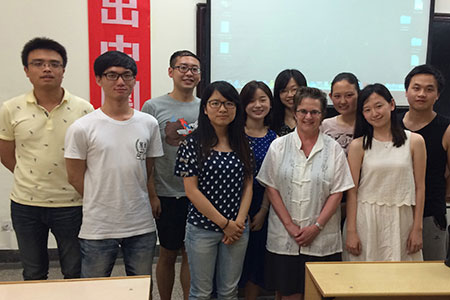
Professor Jan Roberts-Breslin (third from right, first row) taught classes at Communication University of China this summer. (Courtesy Photo)
“I had never been to Asia before,” Roberts-Breslin said. “What I most appreciated was being able to experience China by living and working there, and not simply being a tourist.”
In a class Roberts-Breslin taught on American media, with an emphasis on television and social media, students wrote in journals their reactions to American programming—from documentaries to dramas and sitcoms—compared to the Chinese media.
Students in another class, who were from nine different countries, produced short nonfiction films reflecting on their experiences in China.
“The cross-cultural sensitivity and curiosity they brought to their productions was fascinating,” she said.
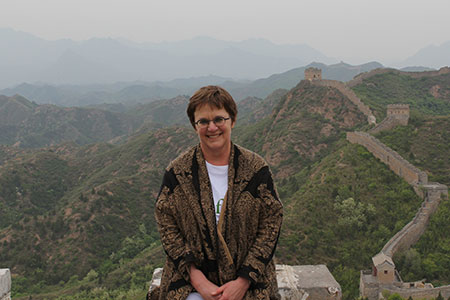
Professor Jan Roberts-Breslin at the Great Wall of China. (Courtesy Photo)
Roberts-Breslin called the people at CUC “incredibly welcoming and helpful,” and hopes to return next year.
“On a side note,” she said, “I went to two weddings and visited the Great Wall three times. I was also able to spend time with two of our MFA alums who have returned to China and are working in the film industry there.”
Communication Conference in India
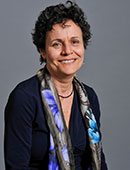 Melinda Robins, associate professor in the Journalism Department, traveled to Hyderabad, India, for the International Association for Media and Communication Research Conference in July, where she delivered an academic paper titled “Palestinian Imaginary: Resistance and Reinvention in Palestine Online,” which discussed how the Palestinian national identity was forged—from the Ottoman Empire to today.
Melinda Robins, associate professor in the Journalism Department, traveled to Hyderabad, India, for the International Association for Media and Communication Research Conference in July, where she delivered an academic paper titled “Palestinian Imaginary: Resistance and Reinvention in Palestine Online,” which discussed how the Palestinian national identity was forged—from the Ottoman Empire to today.
“I’ll be talking about the work with my students in the spring, when I teach Global Journalism,” Robins said. “My research showed both continuity and change in construction of [Palestinian] identity, with resistance to the occupation still at its core even though the dream of an independent state has faded.”
The paper was a follow-up to one Robins presented at the organization’s conference last year in Dublin, Ireland, which examined how Palestinian journalists reconcile their personal and professional identities under occupation.
Arts, Democracy, and Lions in South Africa
Janet Kolodzy, professor in the Journalism Department, has been at Rhodes University in Grahamstown, South Africa, since early July, where she is teaching journalism classes through early September after receiving a fellowship funded by the Andrew W. Mellon Foundation.
Kolodzy is blogging about her experiences, which include contact with lions and other wildlife.
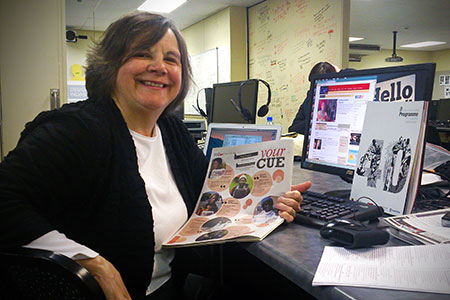
Professor Janet Kolodzy taught journalism classes and worked on a news publication and website in South Africa on a Mellon Foundation fellowship this summer. (Courtesy Photo)
The first two weeks of her fellowship coincided with the National Arts Festival that was held in Grahamstown, which included hundreds of performances—from plays and poetry to concerts, films, and art exhibits.
“To me, the festival experience merged the arts and the communication I enjoy so much at Emerson into an intense 10 days,” said Kolodzy, who noted that the festival fell on the 20th anniversary of South African democracy. “The mix of the political with the art brought about a new understanding to me about how far South Africa has come, yet how far it still has to go in providing economic and social change.”
Larry Strelitz, the head of Rhodes’ journalism school, invited Kolodzy to teach a course after reading her book Practicing Convergence Journalism (2012, Routledge).
During her fellowship, Kolodzy oversaw student journalists who reported on the National Arts Festival for Cue, an arts publication and website.
“For many students, this was their first intense, constant deadline experience,” she said. “They learned how to deal with the pressure while maintaining the discipline and consistency demanded in daily journalism.”
Media Ethics in Montreal
In early August, Professor Tom Cooper of Visual and Media Arts received the 2014 Media Ethics Division Special Recognition Award for Outstanding Teaching, Scholarship, and Service at the annual Association for Education in Journalism and Mass Communication Conference in Montreal, Canada. Cooper, who has taught and researched media ethics for 35 years, is co-publisher of Media Ethics magazine, and he initiated the Emerson College Ethics Circle.
Writing and Literature in Tennessee
Steve Yarbrough, professor; Margot Livesey, senior distinguished writer-in-residence; and Anna Ross, part-time faculty member, all of the Writing, Literature and Publishing Department, participated in the Sewanee Writers Conference in Sewanee, Tennessee. Chris Poole, MFA ’16; Kyle Dacuyan, MFA ’15, and James Scott, MFA ’07, were also in attendance.
“It’s one of the most prestigious writers’ conferences in the country,” said Yarbrough, who has taught workshops at Sewanee for six years. “This year I team-taught a workshop with bestselling novelist Jill McCorkle. I also held private manuscript conferences with students assigned to me and gave a public reading.”
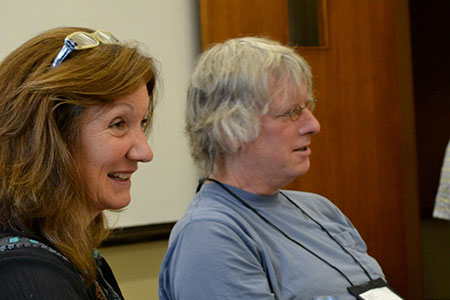
Best-selling novelist Jill McCorkle with Professor Steve Yarbrough at the Sewanee Writers Conference in Tennessee. (Courtesy Photo)
Yarbrough said the Sewanee conference gives him a chance to see the products of MFA programs at other colleges, and to bring fresh ideas back to Emerson.
“Some of the most important things happen outside the workshops,” he said. “Every year a few book deals are hatched there.”
15,000 Years of New England Climate
Wyatt Oswald, associate professor in the Institute for Liberal Arts and Interdisciplinary Studies, who is an environmental scientist specializing in climate change, used the summer to prepare for his yearlong Charles Bullard Fellowship in Forest Research at Harvard Forest, a Harvard University research center. He will study long-term changes in climate and ecosystems in New England, which include analyzing lake sediment cores to reconstruct environmental changes of the last 15,000 years.
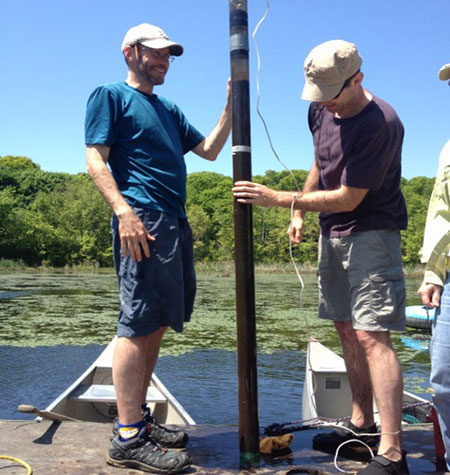
Associate Professor Wyatt Oswald (left) with Assistant Professor Jon Honea collecting sediment samples this summer at Ware Pond in Marblehead, Massachusetts. (Courtesy Photo)
Biology at Mass. General Hospital
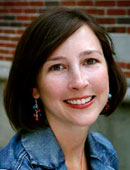 Amy Vashlishan Murray, assistant professor in the Institute for Liberal Arts and Interdisciplinary Studies, is a molecular biologist who spent the summer conducting research full-time in the Department of Molecular Biology at Massachusetts General Hospital.
Amy Vashlishan Murray, assistant professor in the Institute for Liberal Arts and Interdisciplinary Studies, is a molecular biologist who spent the summer conducting research full-time in the Department of Molecular Biology at Massachusetts General Hospital.
“I study the way chemicals in the brain influence long-lasting changes in behavioral state, like mood, appetite, and motivation,” Vashlishan Murray said. “I’ve recently been working on creating a genetic tool kit for studying the psychological and behavioral impacts of these chemicals in living, breathing organisms.”
Vashlishan Murray also participated in several science–related academic conferences over the summer break, including the Standing Up for Science Media Workshop for scientists, the media, and the public at Emerson at the end of the spring semester, which was part of the Ask for Evidence consumer awareness project she oversees.
Categories